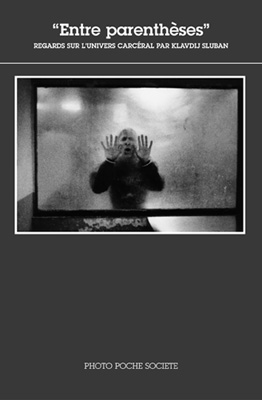Lauréat du prix Niépce (2000) et du prix Leica (2004), Klavdij Sluban, photographe français d’origine slovène établi à Paris, poursuit, à 42 ans, l’approfondissement d’une oeuvre rigoureuse et cohérente. Initié aux subtilités du tirage noir et blanc auprès de Georges Fèvre, titulaire d’une maîtrise de littérature anglo-américaine, il renonce progressivement à l’enseignement pour se consacrer exclusivement à la photographie. Souvent emprunts de références littéraires (Beckett, Milton), les nombreux voyages photographiques de Sluban ne sont pas guidés par l’actualité chaude et immédiate. La mer Noire, les Caraïbes, les Balkans, la Russie, peuvent se lire chez lui comme les cycles d’approfondissement successifs d’une proximité patiente aux réalités rencontrées. Ses noirs profonds, ses silhouettes à contre-jour confèrent à son écriture photographique une droiture et une justesse exemptes de tout didactisme ou exotisme. Balkans Transits, qu’il publie avec François Maspero, est distingué par le prix RFI 1997. Depuis 1995, Klavdij Sluban, quand il ne voyage pas, anime des ateliers photographiques auprès de jeunes détenus. Cet engagement commencé en France (Fleury-Mérogis) avec le soutien d’Henri Cartier Bresson, Marc Riboud et William Klein, s’est poursuivi dans les camps disciplinaires et centres de détention des pays de l’Est (Ukraine, Géorgie, Moldavie, Lettonie), y compris dans les enceintes disciplinaires de Moscou et de Saint-Pétersbourg. Familier des lieux de la détention et partenaire des acteurs qui les peuplent, Sluban déploie photographiquement la problématique des espaces clos et des horizons contraints et nous fait éprouver les fractures d’un enfermement que redouble l’intériorisation des perceptions.
Winner of the Niépce Prize (2000) and of the Leica Prize (2004), Klavdij Sluban is a French photographer of Slovenian origin based in Paris. Now aged 42, he continues the development of his rigorous and coherent body of work. Sluban learnt the subtleties of black & white printing under the guidance of Georges Fèvre. Although he held a Masters’ degree in Anglo-American literature, little by little, he gave up teaching to commit wholly to photography. Never inspired by immediate and sensational current affairs, Sluban’s numerous photography trips are permeated with literary references – for example, Beckett, Milton. The Black Sea, the Caribbean, the Balkans, and Russia can be read as many successive steps of an in-depth study of a patient proximity to the encountered real. His deep blacks and backlit silhouettes convey to his photographic style uprightness and accuracy free of didacticism or exoticism. In 1997, his work Balkans Transits, which he published with François Maspero, was awarded the RFI (International French Radio) prize. Since 1995, when not abroad, Sluban has run photography workshops with young offenders in prison. First originated in France, in the prison of Fleury-Mérogis with support from Henri Cartier Bresson, Marc Riboud and William Klein, this commitment was pursued in the disciplinary camps and prisons of Eastern Europe – Ukraine, Georgia, Moldavia, and Latvia – and in the disciplinary centres of Moscow and St Petersburg. By offering us pictures of those places he is familiar with and of their inhabitants to whom he is a true partner, Sluban unveils the problems of closed spaces and constrained horizons. And by doing so, he brings to both our consciousness and senses the fractures of a confinement enhanced by the internalization of perceptions.
Fotógrafo francés de origen esloveno radicado en Paris, ganador de los premios “Niépce” en el año 2000 y “Leica” en el 2004. A los 42 años continúa el perfeccionamiento de una obra coherente y rigurosa. Se inicia a las sutilezas del revelado en blanco y negro en compañía de Georges Fèvre, y a pesar de un diploma de Literatura angloamericana, renuncia progresivamente a la enseñanza para dedicarse exclusivamente a la fotografía. A menudo inspirados de referencias literarias (Beckett, Milton), los viajes fotográficos de Sluban nunca están guiados por la actualidad inmediata. El mar Negro, El Caribe, Los Balcanes y Rusia, pueden leerse como etapas de estudio sucesivas de una proximidad paciente a las realidades descubiertas. Sus negros intensos, sus siluetas en contraluz, dan a su escritura fotográfica una rectitud y una justeza exenta de todo didactismo o exotismo. En 1997, “Balkans Transits”, publicado junto con François Maspero, gana el premio RFI (Radio Francia Internacional). Desde 1995, cuando Klavdij Sluban no esta de viaje, anima talleres de fotografía destinados a jóvenes detenidos en las prisiones. Este compromiso voluntario comenzó en Francia en la cárcel de Fleury-Mérogis, con el apoyo de Henri Cartier Bresson, Marc Riboud y William Klein, para continuarse en los campos disciplinarios y en los centros de detención de países del este de Europa (Ukrania, Georgia, Moldavia y Letonia), inclusive en los recintos disciplinarios de Moscú y de San Petersburgo. Familiarizado con estos lugares y colaborador desinteresado con los que allí residen, Sluban nos muestra a través de sus imágenes el problema de los espacios confinados con horizontes limitados donde las fracturas que generan el encierro, acentúan la interiorización de las percepciones.


